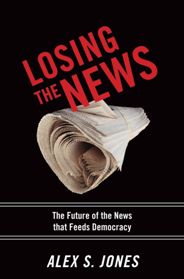
Alex S. Jones covered the press for The New York Times from 1983-1992, winning the Pulitzer Prize in 1987. Jones is the director of the Joan Shorenstein Center on the Press, Politics and Public Policy at Harvard’s Kennedy School of Government and he’s hosted NPR’s “On the Media” and PBS’s “Media Matters.” His most recent book is Losing the News: The Future of the News That Feeds Democracy. Jones talked with Byron Perry for Zócalo about citizen journalism, partisan blogs, and the eroding “iron core” of serious news.
 Q. Can you briefly sum up your argument in the book? What is your take on the future of news?
Q. Can you briefly sum up your argument in the book? What is your take on the future of news?
A. My fundamental argument is that the serious reported news that has been reported, for the most part, by newspapers in this country is disappearing. And as it disappears, along with it is going a very significant part of the journalistic contribution to our democratic society. The idea being that there is an iron core of serious reported news that is the heart of the conversation that we have as a nation. We’re having the conversation, but increasingly that iron core of news is being eroded as journalists are losing their jobs, as newspapers are cutting back on their coverage of serious news, and as the web and other places lend themselves increasingly to opinion and faux news and public relations, rather than reported news by professional journalists.
Q. Can you speak more about what you mean by “the news that feeds democracy” and the role of journalism and news in a working democracy?
A. Sure. I think that the way our democracy is established, we have politics, we have policy, and we have an ongoing conversation that shapes our values and shapes who we are and what we are. The way that’s done is in this national conversation, as I say. But that conversation is based on a set of facts and a body of knowledge that has come for the most part from journalism. That journalism is essential to that conversation. If you erode or damage that journalism at the heart of the conversation, which I think is happening and is in danger of happening significantly more, then the conversation becomes one that is fueled by opinion, by public relations, by misinformation, by spin, and by things that aren’t rooted in the journalism of verification. The difference is between the journalism of verification and what you might think of assertion, which is mostly what we get on cable television now.
Q. Which is more opinion as opposed to fact, you’re saying.
A. Exactly. It’s not that there’s not a good place for opinion. We need opinion. But if you have opinion without this iron core of reported news then you don’t have any basis for factual accuracy and truth that opinion can be based on.
Q. What do you think of citizen journalism? Bloggers and, with the Internet, the rise of average people getting involved with journalism and putting information and photos and videos out there.
A. I think that those things are fine in their place, but I don’t think that they’re a substitute for professional news. I think that citizen journalism is something that is welcome and I think there are a lot of people that are sincere in wanting to be part of the conversation and I don’t think they should be discouraged. But I don’t think that is the same thing as professional, seriously reported news. I don’t think you can expect citizens to go to Afghanistan, or go to meetings of boards and do investigative reporting. I don’t think effectively they’re going to be able to do that without the institutions of journalism that bolster professional journalism. It’s not just a matter of wanting to do it, it’s a matter of having the resources to fight in lawsuits to get information, and to spend years getting the sources that you need over time, and then having the institutional backing that will give real velocity and muzzle power to what you do find out. Because right now there may be some very important information on the web that someone has found out, but without the platform of the institutions of news the chances of that actually making an impact on the public are very small, in my opinion.
 Q. What would you say to someone who said that maybe the venerable institutions of journalism frequently made mistakes and used their influence for certain interests, and that citizen journalism is a way that we can make news more democratic, as opposed to concentrated in these powerful newspapers like the New York Times, say, or the L.A. Times?
Q. What would you say to someone who said that maybe the venerable institutions of journalism frequently made mistakes and used their influence for certain interests, and that citizen journalism is a way that we can make news more democratic, as opposed to concentrated in these powerful newspapers like the New York Times, say, or the L.A. Times?
A. Well, I have to say that I’m certainly not one to ever say that these organizations like the New York Times – where I worked – don’t make mistakes. They obviously do. I think it’s a credit that they admit the mistakes that they make. But again, I think that even though these organizations have made mistakes, they’ve also done great and important things. It was also, for instance, the New York Times that disclosed the information about domestic spying. That’s something that it took a New York Times reporter to ferret out and to get the information and put it on the front page of the New York Times in a way that I don’t think any citizen journalist would have been able to effectively do. As I say, the important point is that the news gets out. I think that that means that there has to be resources there to pay salaries, and mortgages, and send kids to college. Reporters have to be able to do that if they’re going to make a profession of news, and institutions had been able to provide those resources until recently. A citizen journalist may be very valuable, especially when it comes to, for instance, keeping the major news organizations honest. And I think the transparency of the web is a very good thing. But I don’t think citizen journalism is a substitute for professional journalism.
Q. I don’t either. Do you think physical newspapers will disappear in the next couple decades?
A. Gosh, well who knows about a couple of decades? But I don’t think that they’re going to disappear as quickly as some people think they are. I think they’ll be around for a long time because I think that there’s a great power in paper. I think that people underestimate it as a very refined technological product, in that it is portable, it’s cheap, you can fold it, you can wad it up, you can keep it. You can do things with it and you can have the satisfaction, if you’re someone who likes paper as I do, of reading an actual newspaper. Reading the newspaper on paper is something that’s not nearly equated by reading it online, even though I read newspapers online too when I can’t get them on paper. And I think in a way that reading on paper is underappreciated and I think that younger people may come to appreciate it more, just the way young people come to discover over time the pleasures of a dry martini. So maybe it will come with age. I think we’re in a digital world, there’s no question about that. But I think just like there’ll be television and radio and magazines, I think there will be newspapers. And remember, the paper is a delivery system and the Web is a delivery system. I think that there are going to be different ways of getting the information and I think that many people will use them all.
Q. What did you think of the American media’s coverage of the presidential election? With 24-hour news cycles and partisan blogs and, some would say, a real emphasis on sensationalism, do you think they covered it well?
A. I think in some case they covered it well, in some cases they didn’t. But covering presidential campaigns is one of the things that media does probably least well, in the sense that it’s horse race coverage and we seem as a nation to find that irresistible. I think that fact is that a lot of people are not interested in serious news. That’s part of the problem. Not just young people, but older people too. And that’s been the secret that has been ignored by the news media for a long time. But newspapers sold a lot of copies to people who bought them not for the news but for sports, for comics, and for the crossword puzzle. The difference is that then they got the news whether they wanted it or not. Now, if all you’re interested in is TMZ or sports or whatever, you can go to the web and get just that. And that’s what the economic problem for newspapers is: how to survive in a digital world where all this information is aggregated. But I think that in the case of campaign coverage, what you see in those partisan blogs is what the world looks like without the hard core of news. Everything is spawned to be partisan one way or partisan the other. I think most Americans want to read those partisan blogs because they like the combativeness of it, they find them entertaining and interesting. But without that core of what the truth is, they can be very destructive and very misleading. And everybody’s truth becomes just as good as everybody else’s. If nobody is actually trying to call it like it is and tell as much truth as they objectively can, then your truth is as good as mine and yours is no better and mine is no better and who’s to know.
Q. In your book do you make an actual prediction as to where news is headed in terms of whether it’s sort of headed down the tube or whether maybe we can redeem something?
A. Well, I consider this book to be sort of a battle cry. It’s the idea of trying to rally people who are concerned about news to get busy and pay attention because this is our national birthright as far as I’m concerned, this kind of news and having access to it. And if we want to preserve it, we as a country are going to have to rouse ourselves. We’re going to have to tell these organizations that we want them to do it, and if they’re going to have our loyalty and our business they’re going to have to deliver that news. And the news organizations are going to have to organize themselves so that they can make a profit and also deliver this kind of news. And if they decide that they’re going to make a profit but abandon this kind of news, then there’s no point in them surviving as far as I’m concerned. The point is, trying to keep that news and keep these news organizations economically viable, that’s going to be a tough thing to do. But I think that there is certainly a chance as we go into this improving economy that newspapers, that are the traditional providers of three quarters or more of hard core news, I think that they have a chance to deliver themselves back with some journalistic muscle and replace some of those strengths that they have given away in these layoffs and so forth, and to focus and refocus on doing the thing that will win them enduring loyalty from a group of people who will support them as a business.
*Photos of Alex S. Jones and Losing the News courtesy Oxford University Press. Photo of the newpaper courtesy GiantsFanatic.




Send A Letter To the Editors